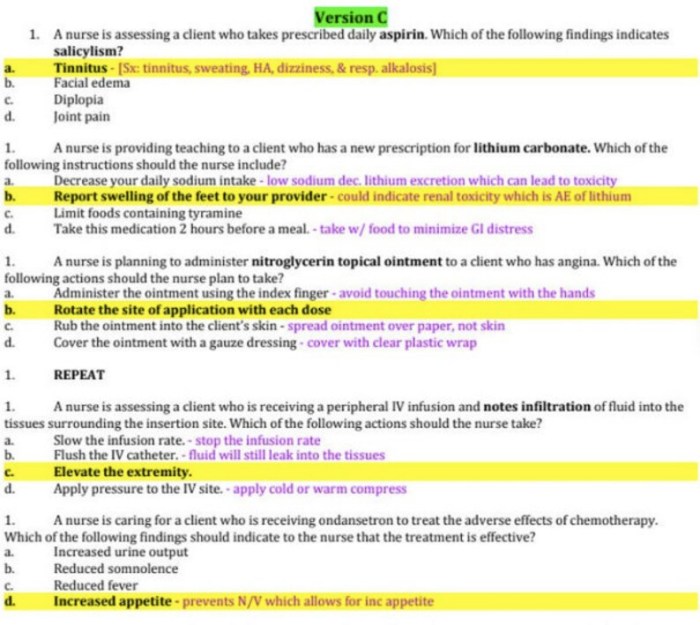Pharmacology 2019 ati proctored exam – Embark on a comprehensive journey through the realm of pharmacology with our in-depth guide to the 2019 ATI Proctored Exam. This authoritative resource unravels the fundamental principles, drug classifications, and intricate mechanisms that govern drug action, empowering you with a profound understanding of this critical field.
Delve into the intricacies of pharmacokinetics and pharmacodynamics, unraveling the processes of drug absorption, distribution, metabolism, and excretion. Explore the responsibilities of nurses in pharmacology, emphasizing the significance of patient education and medication management. Discover the nuances of drug therapy in special populations, ensuring optimal care for children, the elderly, and pregnant women.
Pharmacology Basics: Pharmacology 2019 Ati Proctored Exam
Pharmacology is the study of drugs and their effects on living organisms. It encompasses the discovery, development, mechanisms of action, and clinical use of drugs.
The fundamental principles of pharmacology include:
- Drug-receptor interactions: Drugs interact with specific receptors in the body to produce their effects.
- Dose-response relationship: The effect of a drug is directly proportional to the dose administered.
- Pharmacokinetics: The study of how drugs are absorbed, distributed, metabolized, and excreted by the body.
- Pharmacodynamics: The study of how drugs interact with the body to produce their effects.
Drugs can be administered through various routes, including oral, parenteral (injection), topical, and inhalational.
Mechanisms of Drug Action, Pharmacology 2019 ati proctored exam
Drugs can exert their effects through a variety of mechanisms, including:
- Agonism: Binding to and activating receptors.
- Antagonism: Binding to and blocking receptors.
- Enzymatic inhibition: Blocking the activity of enzymes.
- Ion channel modulation: Altering the flow of ions across cell membranes.
Drug Classifications
Drugs are classified into various categories based on their chemical structure, mechanism of action, or therapeutic use.
Some common drug classifications include:
- Antibiotics: Drugs that kill or inhibit the growth of bacteria.
- Analgesics: Drugs that relieve pain.
- Anti-inflammatories: Drugs that reduce inflammation.
- Cardiovascular drugs: Drugs that affect the heart and blood vessels.
- Central nervous system drugs: Drugs that affect the brain and spinal cord.
Each drug class has its own unique mechanism of action, indications, contraindications, and side effects.
Pharmacokinetics and Pharmacodynamics
Pharmacokinetics
Pharmacokinetics is the study of how drugs are absorbed, distributed, metabolized, and excreted by the body.
The key pharmacokinetic parameters include:
- Absorption: The process by which a drug enters the body.
- Distribution: The process by which a drug is distributed throughout the body.
- Metabolism: The process by which a drug is broken down into smaller molecules.
- Excretion: The process by which a drug is eliminated from the body.
Pharmacodynamics
Pharmacodynamics is the study of how drugs interact with the body to produce their effects.
The key pharmacodynamic parameters include:
- Receptor binding: The process by which a drug binds to a receptor.
- Signal transduction: The process by which a drug-receptor interaction triggers a cellular response.
- Effect: The physiological or behavioral change produced by a drug.
Factors that affect drug response include age, gender, weight, genetic makeup, and disease state.
Nursing Implications
Nurses play a vital role in pharmacology.
Their responsibilities include:
- Patient education: Educating patients about their medications, including their indications, side effects, and proper use.
- Medication administration: Administering medications to patients safely and effectively.
- Medication monitoring: Monitoring patients for adverse drug reactions and therapeutic effects.
- Medication reconciliation: Ensuring that patients are receiving the correct medications at the correct doses.
Nurses must have a thorough understanding of pharmacology in order to provide safe and effective patient care.
Commonly Prescribed Drugs
Some commonly prescribed drugs include:
- Acetaminophen: An analgesic and antipyretic.
- Ibuprofen: A non-steroidal anti-inflammatory drug (NSAID).
- Albuterol: A bronchodilator.
- Metformin: An oral antidiabetic medication.
- Simvastatin: A statin used to lower cholesterol.
Each of these drugs has its own unique indications, contraindications, and side effects.
Drug Interactions

Drug interactions occur when two or more drugs are taken together and their effects are altered.
Types of drug interactions include:
- Pharmacokinetic interactions: Interactions that affect the absorption, distribution, metabolism, or excretion of a drug.
- Pharmacodynamic interactions: Interactions that affect the receptor binding or signal transduction of a drug.
Drug interactions can be clinically significant and lead to adverse events.
Strategies for managing drug interactions include:
- Avoiding combinations of drugs that are known to interact.
- Adjusting the dose of one or both drugs.
- Monitoring patients for adverse drug reactions.
Special Populations
Special populations, such as children, the elderly, and pregnant women, have unique considerations for drug therapy.
Factors to consider include:
- Age-related changes in pharmacokinetics and pharmacodynamics.
- Potential for adverse drug reactions.
- Drug interactions.
Nurses must be aware of these special considerations when administering medications to patients in these populations.
FAQ Insights
What is the significance of the 2019 ATI Proctored Exam?
The 2019 ATI Proctored Exam is a comprehensive assessment that evaluates the knowledge and skills of nurses in pharmacology. It is a valuable tool for ensuring competency in medication administration and patient care.
What are the key concepts covered in this guide?
This guide encompasses the fundamental principles of pharmacology, drug classifications, pharmacokinetics, pharmacodynamics, nursing implications, commonly prescribed drugs, drug interactions, and considerations for special populations.
How can I prepare effectively for the 2019 ATI Proctored Exam?
Thoroughly study the concepts Artikeld in this guide, utilize practice questions, and seek guidance from experienced pharmacology professionals to enhance your preparation.